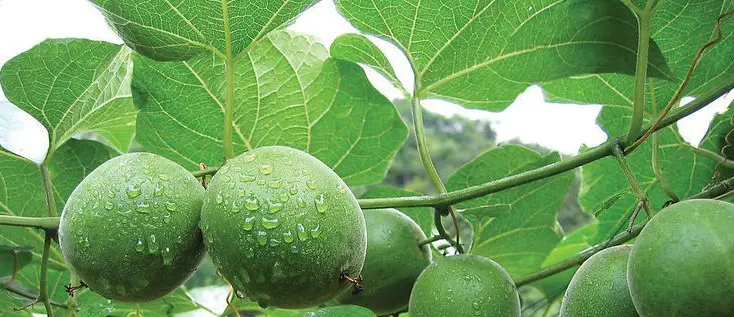| Online: | |
| Visits: | |
| Stories: |

| Story Views | |
| Now: | |
| Last Hour: | |
| Last 24 Hours: | |
| Total: | |
Power-Packed Longevity Fruit a Boon for Diabetics (and Health Enthusiasts Too)
28th March 2015
Contributing Writer for Wake Up World
A fruit belonging to the gourd family is causing quite a stir among health conscious consumers as an all-natural sweetener that won’t aggravate diabetes or contribute to maladies like cancer, heart disease, obesity, candida or tooth decay. Many times sweeter than sugar, Luo Han Guo (Siraitia grosvernorii) only contains 2 calories per serving and will not elevate blood sugar levels. The secret to its sweetness is found in mogroside, a compound from the same glycoside family as stevia.
A humble melon, the fruit was reportedly eaten by monks in 13th century China and is frequently known by its common name: monk fruit. Considered a longevity superfood, local residents of the Guangxi Province in Southern China consume the fruit regularly and enjoy exceptional life spans.
Monk fruit is difficult to find fresh because of its short shelf life and unpalatable flavor. However, once dried, the fruit takes on a nutty aroma and sweet, caramel toffee flavor, notes the wellness site Make Health Connect. Luo Han Guo extract has a clean taste that’s void of bitterness and is useful for adding a touch of sweetness to beverages, cooked foods and baked goods.
High in vitamin C, protein and 18 amino acids, monk fruit is a nutritional powerhouse that has been used medicinally for everything from allergies to heart disease and cancer. Monk fruit also supports immunity and both the endocrine and respiratory systems. Over and above that, Luo Han Guo tea helps to cool heat stroke, reduce inflammation of the throat, encourage elimination in the elderly and soothe digestive complaints. Nevertheless, where the fruit really shines is with diabetes.
Support balanced blood sugar
Despite a sweetness several hundred times higher than table sugar, monk fruit extract does not raise blood sugar levels, but actually lowers it — along with total cholesterol and triglycerides. As an added perk, the sweetener also improves liver function.
Additionally, a study published in the British Journal of Nutrition discovered that the extract protects against cellular damage and lowers urinary albumin levels in animal tests. This is good news for those who would like to avoid kidney damage associated with diabetes.
Defend against cancer, allergies, cardiovascular disease and more
 Although Luo Han Guo has received widespread praise as a diabetic-safe sweetener, don’t overlook the other beneficial aspects of the fruit. Studies have shown that the extract demonstrates significant antihistamine effects in mice. Apparently, the fruit calms mast cells that release compounds such as histamine — which is linked with asthma and allergic reactions.
Although Luo Han Guo has received widespread praise as a diabetic-safe sweetener, don’t overlook the other beneficial aspects of the fruit. Studies have shown that the extract demonstrates significant antihistamine effects in mice. Apparently, the fruit calms mast cells that release compounds such as histamine — which is linked with asthma and allergic reactions.
And Blanche Levine of Natural Health 365 reports:
“Japanese laboratory studies found that mogrosides from Luo Han Guo showed extraordinary effects against skin cancer in mice. This is note worthy since research supports the idea that sugar consumption elevates the risk of cancer. Perhaps it’s the type of sweetener, since the sweet monk fruit seems to be able to elicit the opposite response.”
Luo Han Guo also reduces the oxidation of cholesterol — an important factor in lowering the risk of stroke and cardiovascular disease. Moreover, monk fruit has long been used as a remedy for fevers, colds, coughs and respiratory diseases.
[FACEBOOK]: http://www.facebook.com/joinwakeupworld (An interactive community of over 1,700,000)
[PINTEREST]: http://pinterest.com/wakeupword/
[TWITTER]: http://twitter.com/joinwakeupworld
[YOUTUBE]: http://www.youtube.com/joinwakeupworld
[GOOGLE PLUS]: https://plus.google.com/
[WEBSITE]: http://wakeup-world.com




